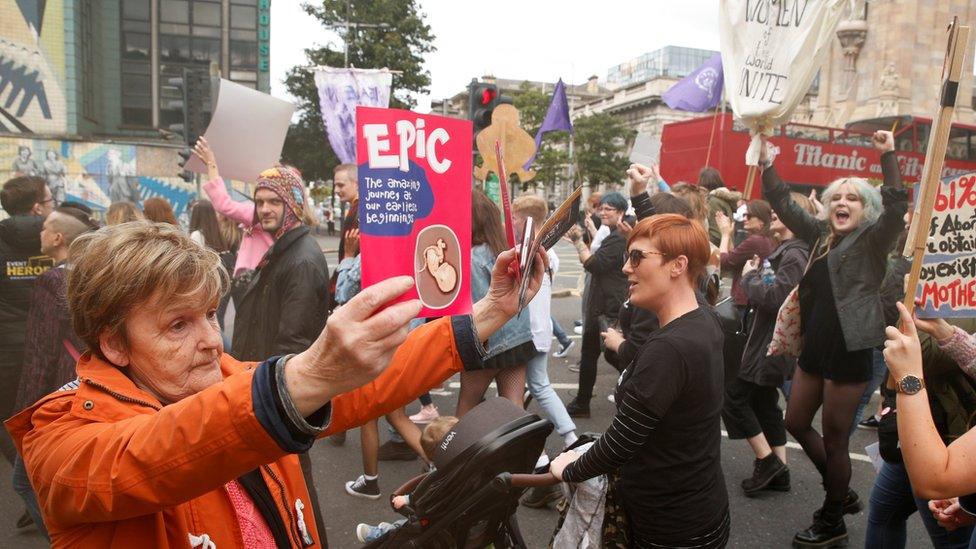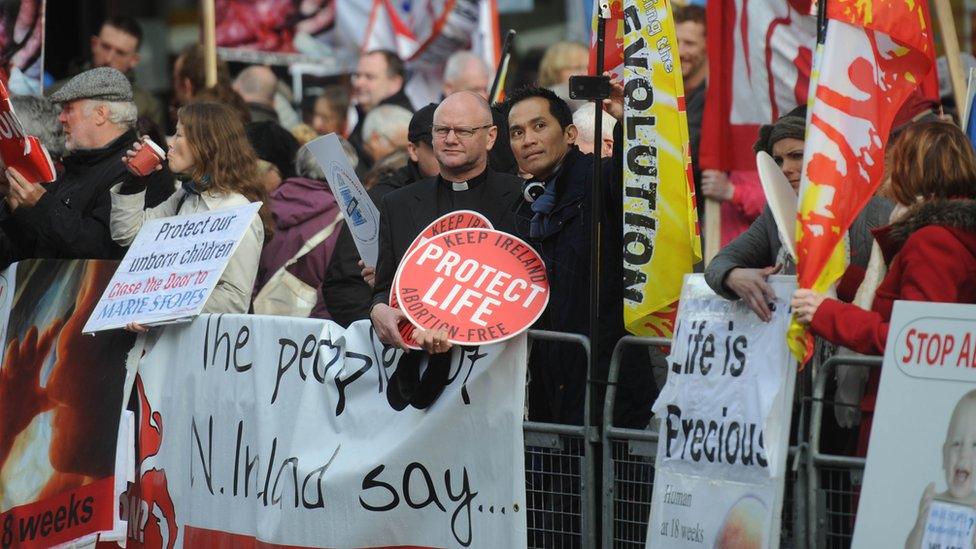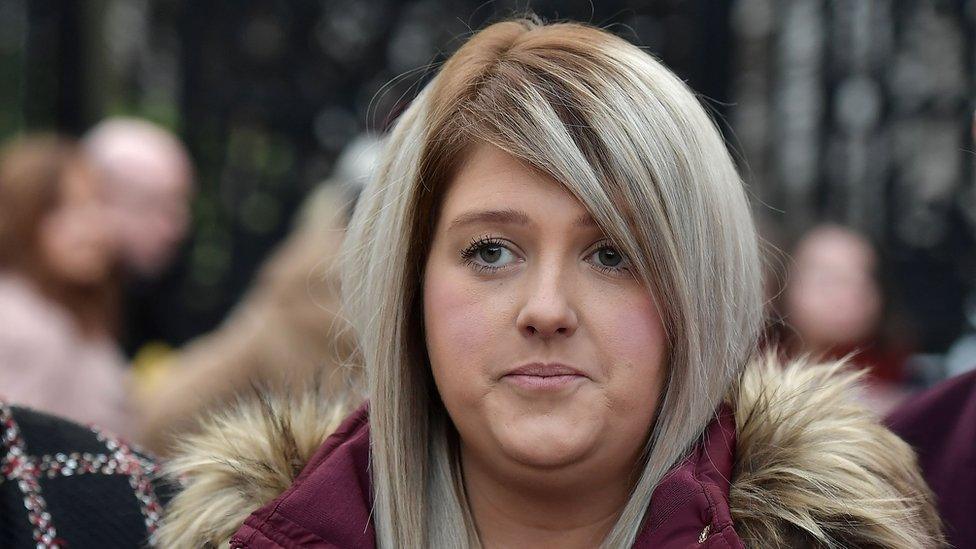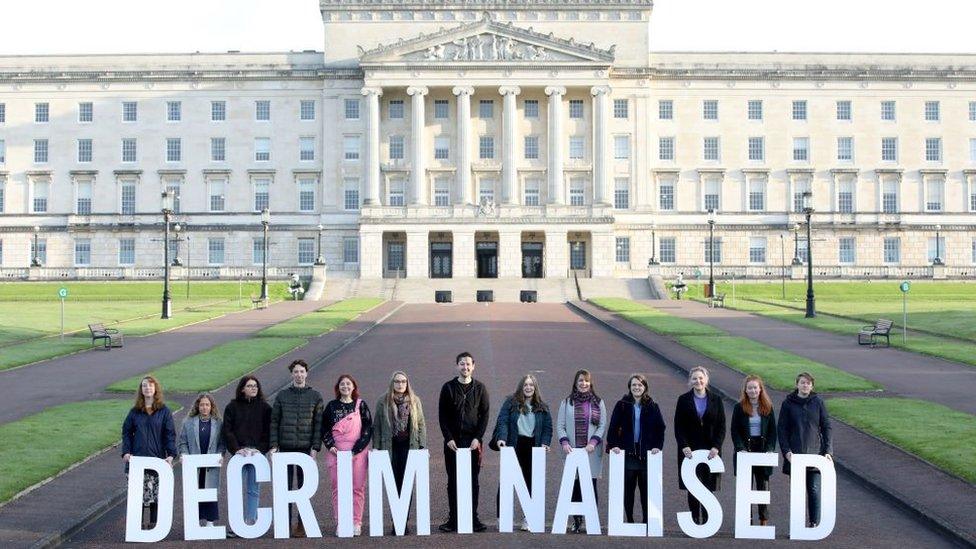Abortion in NI: Timeline of key events
- Published

Campaigners on both sides of the issue took the streets of Belfast in September 2019, a month before NI's abortion laws changed significantly
The sensitive issue of abortion has long divided opinion in Northern Ireland.
In recent years, the laws have changed and the Democratic Unionist Party (DUP) is now attempting to amend them again.
The laws covering abortion in Northern Ireland were initially the Offences Against the Person Act 1861, and later the Criminal Justice (Northern Ireland) Act and Infant Life (Preservation) Act in 1945.
In the vast majority of circumstances, it was a criminal offence in Northern Ireland to have or perform an abortion.
The 1967 Abortion Act made terminations legal in Great Britain up to 24 weeks in most circumstances - but was never extended to Northern Ireland.
For decades in NI, abortions were allowed only if:
A woman's life was at risk
There was a risk of permanent and serious damage to her mental or physical health
It meant that in many cases, women from NI seeking access to abortion services had to travel to England.
The contentious matter ended up before the courts on a number of occasions, and also divided parties in the Stormont Assembly.
BBC News NI looks at the timeline of key events that have led to this point.

June 2000
The Stormont Assembly passes a non-binding motion opposing the extension, external of the 1967 Abortion Act to Northern Ireland.
March 2002
The Family Planning Association takes a High Court challenge, external over NI's abortion laws, arguing the Department of Health should publish clear guidelines on how terminations are provided under existing law.
This is rejected but in a Court of Appeal ruling two years later, judges order the Department of Health to draw up guidelines, external on when abortions can be carried out.
February 2010
Abortion policy is devolved to the Northern Ireland Assembly as part of wider policing and justice powers, external under the Hillsborough Castle Agreement.
At this stage, a majority of political parties remain opposed to amending the laws to bring them in line with other parts of the UK.
October 2012

The opening of a private clinic in Belfast sparked large protests
The first private clinic in Northern Ireland to offer abortions opens in Belfast.
The service, run by Marie Stopes, draws regular protests.
March 2013
A bid by DUP and SDLP assembly members to ban abortions being performed by private clinics fails to pass as it does not get cross-community support in the NI Assembly.
Sinn Féin, along with MLAs from Alliance and the Green Party, sign a petition of concern that allows them to effectively block the proposal.
October 2013
The issue is put back on the agenda again when Sarah Ewart, who travelled from NI to England for an abortion because her baby had been diagnosed with anencephaly, speaks out about her experience.

Sarah Ewart, whose baby was not going to survive birth, travelled to England for an abortion
Fatal fetal abnormalities are not, at that stage, grounds for abortion under law in Northern Ireland.
April 2015
Stormont's Department of Justice recommends a change to the law to allow terminations in cases of fatal fetal abnormality, following a public consultation on amending the criminal law on abortion.
Then Justice Minister David Ford announces he will draft new legislation seeking to make limited changes, but these will require approval in a vote in the NI Assembly.
November 2015
Belfast's High Court rules that Northern Ireland's abortion legislation is in breach of human rights law, following a case taken by the Northern Ireland Human Rights Commission.
February 2016
Then Health Minister Simon Hamilton is asked to establish a working group of officials to look at how the issue of fatal fetal abnormality can be addressed.
It comes days before an emotive debate in the assembly, where a bid to legalise abortion in those cases is voted down by a majority of MLAs (59 votes to 40).
A proposal to permit abortions in cases of sexual crimes such as rape or incest is also rejected by the assembly, by 64 votes to 30.
The following month, guidance for health and social care staff on the termination of pregnancies is published by the Department of Health, external.
November 2016
Stormont's working group on abortion law in NI recommends changing the law in cases of fatal fetal abnormality, it emerges.
But two months later, the power-sharing institutions at Stormont collapse following a row between the two parties leading the executive, the DUP and Sinn Féin.
June 2017
The British government announces that women in Northern Ireland will be allowed to avail of free abortions in England, following a case raised in the UK Supreme Court earlier that month.
Around the same time, Belfast's Court of Appeal rules that NI's abortion laws are a matter for the Stormont assembly, effectively overturning the 2015 High Court ruling that found NI law had breached the European Convention on Human Rights.
This prompts the NI Human Rights Commission to take the case to the Supreme Court.
February 2018
A United Nations committee releases a report stating the UK has been breaching the rights of women in Northern Ireland by limiting their access to abortion services.
The report makes 13 recommendations - including the repeal of the criminal sanction on abortion contained in the 1861 Offences Against the Person Act.
June 2018
The NI Human Rights Commission loses its Supreme Court appeal over the legality of NI's abortion laws, but a majority of judges agree the laws are "incompatible" with human rights.
But the judges state they would have required the case to have been brought by a woman who was pregnant as a result of sexual crime or who was carrying a fetus with a fatal abnormality.
January 2019
Sarah Ewart begins a High Court challenge in her own name, following the failed Supreme Court case by the NI Human Rights Commission to change NI's abortion laws - the High Court later rules in her favour.
July 2019
In an unusual move, MPs at Westminster back an amendment to the NI Executive Formation Bill going through Parliament that sets the clock ticking for potentially significant change to NI's abortion laws, if devolution is not restored by 21 October.
The proposal from Labour MP Stella Creasy to decriminalise abortion in NI is supported by 332 votes to 99.
It also puts a duty on the British government to create new laws by implementing the recommendations of the UN Committee on the Elimination of Discrimination Against Women (Cedaw) report, published in 2018.
But the moves are criticised by some Stormont parties who argue against intervention from Westminster, while both anti-abortion and pro-choice campaigners hold respective protests over the issue.
October 2019
Devolution is not restored in time and the laws change, despite a last-ditch attempt by some Stormont parties to recall the assembly and stop the changes from happening.

Pro-choice supporters gathered at Stormont on 21 October 2019
Days later at Belfast's Crown Court, a woman is found not guilty of buying abortion pills for her teenage daughter following the decriminalisation of abortion in NI.
March 2020
Devolution at Stormont is restored in early 2020 but the Northern Ireland Office is already in the process of designing the new abortion regulations.
The British government then publishes details of the new legal framework for abortion services, external in Northern Ireland that take effect from 31 March.
It permits terminations in all circumstances in the first 12 weeks of pregnancy, and beyond that in other cases including no term limit in cases of fatal fetal abnormality, where there is a substantial risk that the fetus would die or, if born, would suffer a severe mental or physical impairment.
The regulations say it will be up to Stormont's Department of Health to commission full services.
April 2020
Some of NI's health trusts begin operating interim services for early medical abortions up to the first 10 weeks of pregnancy, after the department receives legal advice it says permit terminations to be carried out at health and social care premises by medical professionals in Northern Ireland.
Health Minister Robin Swann says wider commissioning of services remains a cross-cutting matter - one that is the responsibility of more than one Stormont department - and so requires executive approval.
The British government continues to provide funding for women in NI to travel to England for abortion provision during the coronavirus pandemic.
June 2020
The NI Assembly backs a non-binding motion brought by the DUP rejecting the changes to NI's abortion laws.
A Sinn Féin amendment seeking to alter the motion to only restrict access to abortions in cases of severe fetal impairments, such as Down's syndrome, is voted down.
October 2020
Amnesty International claims there is a "postcode lottery" for abortion services in Northern Ireland, after some health trusts providing interim provision close due to limited resources.
The trusts later restart the provision and the Department of Health states it is "not required" to commission permanent services.
February 2021
DUP MLA Paul Givan proposes a new law to prevent abortions being carried out in Northern Ireland in cases of non-fatal disabilities.
March 2021
The Westminster government signals its intention to give NI Secretary Brandon Lewis new powers to compel Stormont to implement abortion laws.
April 2021
The Western Health Trust announces it will suspend its interim early abortion services from 23 April as the system is no longer sustainable.
It says this is a "temporary pause", adding: "The trust requires additional nursing and medical support in order to deliver this service and are actively exploring all options in respect of this.
"The trust apologises for any concern this may cause and can assure the public that we are continuing to work towards minimising any disruption this will cause in the interim period."
May 2021
Belfast's High Court hears a legal challenge brought by the NI Human Rights Commission, against the NI secretary, the Stormont Executive and NI's Department of Health over the delay in commissioning abortion services.
It argues that the delay has been a "deeply troubling exercise in finger-pointing".
July 2021
Westminster issues a formal direction to Stormont's Department of Health to set up full abortion services in Northern Ireland by no later than March 2022.
The powers also compel Stormont's first and deputy first ministers that "once proposals are brought forward by the Department of Health, they must be included on the agenda" at the next executive meeting.
October 2021
A second legal challenge over abortion laws begins, taken by anti-abortion campaigners against the government for issuing the direction on Stormont to impose a deadline to establish services.
The Society for the Protection of Unborn Children (Spuc) argues that Brandon Lewis has imposed a power grab on Stormont by overriding the devolution settlement.
February 2022
A High Court judge ruled the Northern Ireland Secretary Brandon Lewis has the legal authority to direct the establishment of abortion services.
The judge rejected the legal challenge by Spuc
But Mr Justice Colton held that Mr Lewis was compelled to take the step after a United Nations body found in 2018 the UK had breached the rights of women in Northern Ireland, by limiting access to abortions.
May 2022
Stormont's Department of Health is told on 19 May that it must start setting up a fully-funded abortion service for Northern Ireland "within days to weeks" by Northern Ireland Secretary Brandon Lewis.
Mr Lewis was acting under new powers to remove the need for the executive to approve plans first.
The UK government had indicated it would itself act on abortion services after the Stormont assembly election, if an executive was not restored by then.
Mr Lewis said he had a "legal and moral duty" to intervene due to the lack of progress.